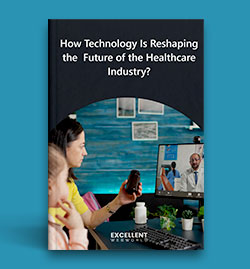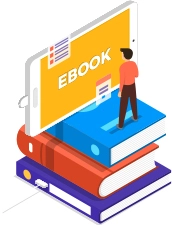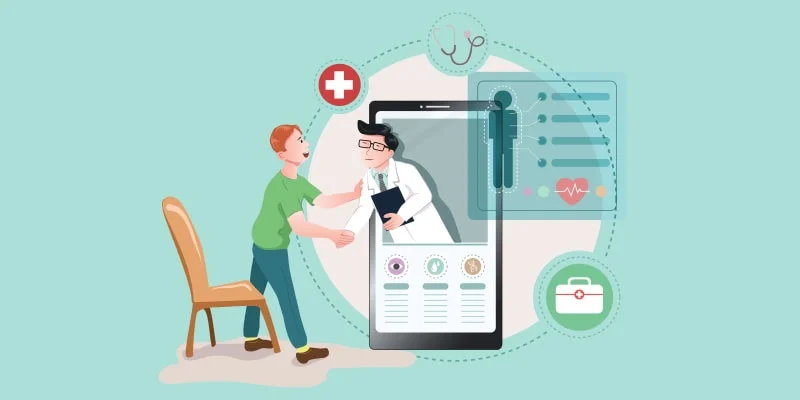The healthcare industry is rapidly going mobile.
From hospitals to healthcare SaaS providers, leaders across the industry are shifting towards mHealth apps to streamline their workflows, improve patient experiences, and drive smarter decision-making. With the mHealth market projected to exceed $60 billion, businesses and organizations are taking action to gain a competitive advantage.
Thinking beyond basic health tracking, today’s mHealth solutions offer real-time remote monitoring and AI-tailored diagnostics. This results in automated workflows and helps secure data integration with EHR systems.
Still thinking it’s too early to invest in mHealth?
Here’s the truth: if you don’t, then your competitors will.
So, let’s not wait until it’s too late. Let’s explore how the mHealth app development is becoming a game-changer and how you can stand out from the others.
What is mHealth?
mHealth, or mobile health, refers to the use of mobile phones, smart devices, and other wireless technologies to support health and wellness. It enhances healthcare technology innovations that improve access to patient care. Helps people stay connected to their health anytime and anywhere, from tracking steps to receiving reminders to take medications.
mHealth apps like MySugr, Fitbit, MyFitness, and Apple Health enable users to easily track their fitness, improve daily habits, and monitor other health activities through their phones. These apps enable you to take your medications on time, track your sleep habits, count your steps, and log your blood sugar levels. An mHealth app appears to be an essential component of the mHealth app development industry, where the integration of advanced tech stacks tends to enhance healthcare delivery and patient engagement.
According to Grand View Research’s statistical report, the mHealth app market was estimated at USD 62.7 billion in 2023 and is projected to grow at a CAGR of 14.1% from 2024 to 2030. Healthcare industries are undergoing great transformations due to emerging trends such as wearables, telehealth, blockchain technology, AI, and ML.
For businesses looking to get involved in mHealth app development, this Healthcare App Development Guide provides a detailed guide to building successful healthcare apps.
Why Does mHealth Matter?
mHealth apps are changing patient care by enabling real-time health monitoring, medicine recommendations, and remote consulting. This healthcare software modernization allows patients to manage their health and make informed, strategic decisions for effective, personalized care.
These apps facilitate virtual consultations, remote monitoring, and data-driven patient care, offering evidence-based treatment suggestions. With the integration of AI-driven diagnostics, telemedicine, and IoT-based monitoring, mHealth can provide personalized and efficient healthcare.
mHealth app plays an important role in the healthcare industry through various features like
Types of mHealth Applications & Their Use Cases
mHealth apps come in various types, each designed to meet specific healthcare needs. From the AI-integrated mHealth apps that offer personalized suggestions to fitness ones that help you stay active, these digital health tools are transforming healthcare. Whether it is a chronic disease condition or mental wellness, there is an mHealth app available for every aspect of care.
Let’s briefly discuss more such types of mHealth applications and their use cases in the table below.
| mHealth App Types | Use Cases |
|---|---|
| Clinical & Diagnostic Apps |
|
| Remote Monitoring Apps |
|
| Productivity & Workflow Apps |
|
| Medication Reminder Apps |
|
| Text and Video Communication Apps |
|
| Mental Health & Wellness Apps |
|
| Chronic Disease Management Apps |
|
Must-Have Features of a Successful mHealth App
The most significant features to consider when building a successful app are those that ensure a seamless user experience, robust data security, and seamless integration with existing healthcare systems. Add-ons focusing on personalization, real-time data insights, and scalability will enhance your mHealth app’s capabilities. Let’s explore the most essential features.
Ready to transform healthcare with IoT and AI-driven mHealth apps? Consult our experts now and explore how these advanced technologies can elevate your app development. Start your journey now.
Now that you have understood the rise in the mHealth app market, understand why investing in custom mobile app development is beneficial.
Benefits of mHealth Apps for Healthcare Professionals & Patients
While we discuss the benefits of the mHealth app for doctors, healthcare companies can also benefit from and reap these advantages. Among the various reasons why developing a health app is popular, we would like to highlight a few significant advantages of healthcare software here.
1. Easy Access to Health Records & Improved Data Management
The mHealth app allows easy access and management of bulk records and documents. It also helps doctors manage and monitor their patients’ health remotely. The key benefit of developing the mHealth app service is storing reports that could be misplaced if handled manually. With EMR systems, doctors and patients can access any information at any time.
The mHealth app service can securely store and manage a larger volume of patient reports, lab results, and prescriptions in one centralized system. As a result, this not only ensures great efficiency but also improves accessibility for the healthcare providers.
2. Early Disease Detection & Predictive Analysis
Symptom trackers with machine learning algorithms help physicians identify the correct disease at its initial stage. Therefore, the increase in innovative technology and solutions has reduced the incidence of human error.
For instance, data from wearable devices can help treat patients more effectively. This prevents any misdiagnosis when every second is fatal. Accurate reports enable doctors to prescribe the right medicines and treatments. With real-time data tracking and predictive analytics, diseases can be detected early, thus enabling timely intervention. Analyzing a patient’s potential health risks enables doctors to identify and address potential health issues proactively, providing tailored care solutions.
3. Reducing Patient Wait Times & Hospital Queues
In those traditional days, hospital staff had to manage a list of patients, their medication, the time of their visit, and the following schedules, among other tasks. Gone are the days when people lined up at the reception check-in kiosk needing an appointment.
Thanks to technology, mHealth app developers have developed an app to manage this. Bookings and scheduling slots are now done via apps in less time. Nowadays, mHealth plays a crucial role in reducing wait times and addressing queue issues by enabling online appointments and remote consultations. With the help of a booking system, it ensures more timely access to medical care and greater efficiency in hospital operations.
4. Enhancing Doctor-Patient Communication & Coordination
This app enables doctors to connect and communicate with staff and patients simultaneously. mHealth apps can notify patients about emergency department (ED) arrivals, admissions, and discharges on their mobile devices.
You can get real-time alerts and streamline care in each case. Communicate and coordinate with on-demand doctors as needed, making it easy to manage each case. The mHealth app enhances patient-doctor communication with real-time messaging, video consultations, and a secure file-sharing system, allowing for seamless interaction between patients and healthcare providers.
5. Online Clinician Training & Continuous Learning
An inexperienced physician may negatively impact the quality of healthcare. These apps offer online training through VR and AR, enabling physicians to learn more effectively and diagnose accurately.
Hence, customized augmented reality apps for healthcare offer practical training. Getting trained via apps has become easy. They help you diagnose online accurately, preventing the burden of frequent clinic visits. The mHealth app facilitates online clinician training, providing wider accessibility to a range of medical webinars, medical courses, and up-to-date research materials, ensuring that healthcare providers stay updated with the latest practices. Continuous learning helps improve skills, enhances knowledge, and enables individuals to stay ahead of others, ultimately leading to better patient care.
6. Medication Adherence & Post-Treatment Care
It’s challenging to manage a patient’s health records after treatment. You may not know whether they are purchasing medications from any pharmacy. As a result, poor medication adherence can lead to chronic conditions.
mHealth apps for patients have transformed access to healthcare services, automating medication reminders and refilling requirements. Another crucial adherence that most medical practitioners need to ensure is the billing code. They can leverage medical billing software development to create systems compliant with ICD-10 and CMS guidelines.
Medical adherence is enhanced by sending and tracking reminders to ensure that patients are following their regimen. Providing follow-ups, reminders, and virtual checkups, there is also an improvement in patient care.
7. Simplified & Organized Payment Structure
Managing the patient’s bills and payments becomes more complex while treatment is still ongoing. Earlier, working everything offline was chaos.
Hence, with the help of health mobile app development, you can help your patients make payments seamlessly. There’s no need to track each bill manually. This reduces paperwork and allows for quicker payment processing through the mHealth app. Thanks to a simplified and organized structure, mHealth apps enable easier billing and transactions for patients. Using a secure payment gateway, they can effortlessly complete transactions for consultations, prescriptions, and treatments.
With the above-listed benefits, we are confident that you understand why investing in the development of mobile health apps is worth every penny.
Read More: A Complete Telemedicine App Development Guide
Challenges in mHealth App Development & How to Overcome Them
Let’s see the tabular representation for a better understanding of the challenges and the solutions that are associated with the mHealth App.
| Challenges | Solutions | Examples |
|---|---|---|
| Data Security & Compliance Issues |
|
Apps like MyChat use HIPAA compliance for security. Adhering to these standards can mitigate regulatory barriers for healthcare apps. |
| Interoperability with Existing Healthcare Systems |
|
EHR systems like Cerner & Epic integrate with mHealth apps for better patient data management. |
| Low User Adoption & Patient Engagement Barriers |
|
Apps like Headspace use simple interfaces and personalized meditations for user engagement. |
| Monetization & Revenue Model Selection |
|
Apps like Fitbit use a subscription model for revenue generation. |
Emerging Trends in mHealth App Development
The mHealth trend is rapidly evolving with innovations that utilize advanced technologies to enhance patient care, improve security, and optimize healthcare delivery.
1. AI & Chatbots for Virtual Health Assistants: AI in mHealth is transforming the way patients connect with healthcare service providers. AI chatbots provide personalized health advice, appointment scheduling, and symptom identification based on patient records, offering 24/7 support. In fact, these use cases reflect how AI in healthcare app development is being applied to improve patient assistance and engagement.
Pro Tip: Leverage AI & ML in mHealth app development to provide personalized healthcare insights and predictive analytics that transform patient outcomes and improve engagement.
2. Blockchain for Data Security & Patient Records: Blockchain in healthcare security helps create secure and immutable records, enhances data privacy, and protects against data breaches.
3. Telemedicine & Remote Patient Monitoring Advancements: In 5G-powered telemedicine is being integrated for faster remote consultations. In combination with IoT healthcare devices, one can offer better remote consultations and continuous patient monitoring.
4. Augmented Reality (AR) for Medical Training: AR and VR in medical training enable healthcare service providers to implement complex processes in a virtual environment, enhancing skill development while minimizing costs through real-world simulations. It also helps deliver great personalizations and interactive learning experiences, and enables the safe practice of complex procedures, thereby improving medical outcomes.
5. Gamification and Behavioral Nudges in Healthcare Apps: By incorporating gamification (utilizing game-like elements such as rewards, points, and leaderboards) and behavioral nudges (prompts that encourage healthy choices), mHealth apps motivate patients to adopt a healthy lifestyle, track their fitness progress, and adhere to their treatment. These features and wearable health monitoring devices help individuals stay on track with their wellness goals.
Pro Tip: Integrating wearables and IoT healthcare devices offers real-time monitoring, empowering patients and doctors with actionable data.
How to Build a mHealth App
1. Identify Core Problem and Target Users: Define the specific healthcare issue your app will address and identify the target audience (such as patients, doctors, and healthcare providers) to ensure better functionality.
2. Choosing the Right Platform (iOS, Android, and Web): You must select the most suitable platform based on your preferences and accessibility, while considering the custom mobile health app development process.
3. Partnering with a Healthcare App Development Company: Collaborating with a dedicated healthcare app development company that specializes in mHealth app development services can bring your vision to life.
4. Selecting the Best Monetization Model: Choosing a sustainable monetization model, such as subscriptions or in-app purchases, helps ensure scalability through cloud computing in mHealth.
5. Building an MVP (Minimum Viable Product) & Iterative Development: You should create a minimum viable product (MVP) for mHealth apps to test the core features, followed by agile development for healthcare apps to refine and expand based on user feedback. With the agile approach, there are fewer iterations and improvements based on real-time user feedback, ensuring that the app meets healthcare needs and regulatory requirements.
6. Testing for Compliance & Security Measures: To implement robust security, ensure compliance with HIPAA, GDPR, and other relevant regulations. Conducting thorough testing also helps protect sensitive data from breaches.
7. Launching, Marketing & Scaling the App: After the testing process, it is crucial to implement effective marketing campaigns for scaling up. UI/UX design is crucial in the development phase to ensure a seamless user experience. However, these design changes are separate from the marketing efforts that focus on promoting the app and maintaining user engagement.
Thinking of Creating Your Own mHealth Software? Let’s Talk!
The healthcare industry is the fastest-growing sector, and medical device development is undergoing significant transformation, including advancements in telemedicine, mHealth, blockchain-oriented healthcare systems, IoT, and wearable devices. At Excellent Webworld, we specialize in mobile health apps, leveraging advanced technologies such as AI, IoT, and blockchain to deliver secure and innovative solutions in the healthcare industry. However, if you are still confused about how to develop a software solution for these, connect with us.
We are the premier mHealth app development company, with expertise in custom AI-driven mHealth app development. Our expertise stems from extensive experience in developing cutting-edge solutions, and we are ready to discuss this with you.
If you want to hire dedicated developers with specialized knowledge in mHealth app development, consider learning from us. In addition, we also offer top-notch mHealth app development services to help you navigate challenges such as privacy concerns and data management. Additionally, we provide health tech software development and enterprise healthcare solutions tailored to meet your business’s specific needs.
Conclusion
Finally, we come to the end of this article. MHealth apps are transforming healthcare by offering patient care, smooth communication, and efficient management of health data. As the landscape evolves, it is crucial to stay ahead of emerging trends and understand the must-have features. There are multiple other apps, such as fitness apps and mental health apps, developed to track a patient’s health. In general, such apps can benefit both healthcare professionals and patients.
If you’re considering creating your mHealth solution, explore how our expert team can help bring your vision to life. Now that you have read all about mHealth app development, take action to Partner with a healthcare app development company and enjoy the benefit of providing health services remotely.

The e-book can be a perfect guide for you to understand a step-by-step process of how various technology works with healthcare.

FAQ
mHealth apps will help you assist your patients remotely. You can also conduct monitoring activities to help your patients improve their understanding of their health. The primary reason for using this app is to ensure patient compliance and track their medications.
Our mHealth/mobile health app development services encompass the sharing of health information, telehealth applications, wellness apps, chronic disease trackers, and remote healthcare applications that are seamlessly integrated with Electronic Health Record (EHR) software systems.
Our team of developers is experienced and has developed similar apps in the past. We provide end-to-end product design and development solutions as per your requirements, with post-development services too.

Article By
Mayur Panchal is the CTO of Excellent Webworld. With his skills and expertise, He stays updated with industry trends and utilizes his technical expertise to address problems faced by entrepreneurs and startup owners.





